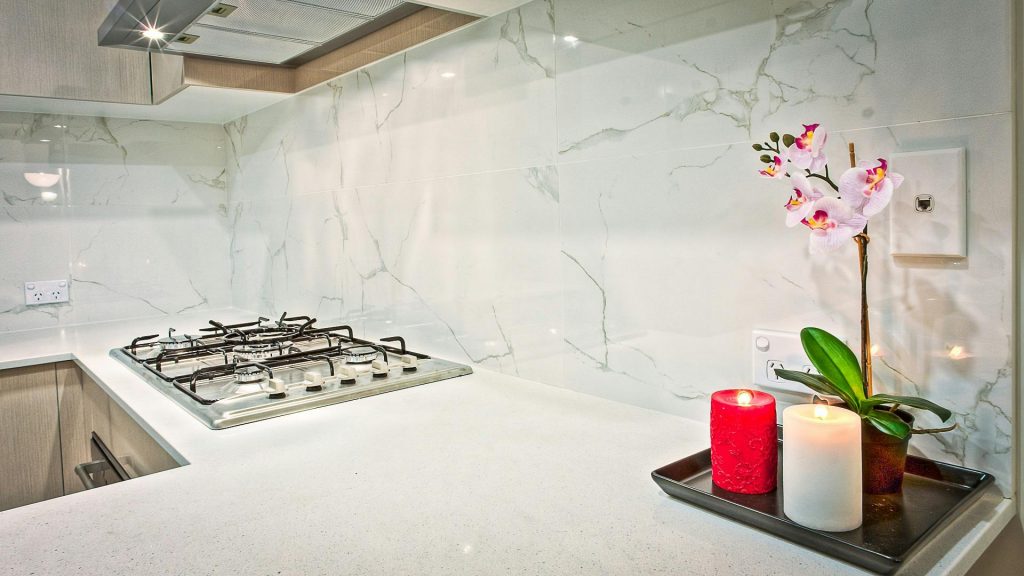Comparing Worktop Surfaces: Marble, Granite, Quartz, and Porcelain
When selecting the perfect worktop for your kitchen or bathroom, it’s essential to consider the unique characteristics of each material. This comparison will focus on four popular options: marble, granite, quartz, and porcelain. Each has its advantages and disadvantages, making them suitable for different preferences and needs.
Marble Worktops
Advantages:
- Uniqueness: Each marble slab is distinct, ensuring that your worktop is one-of-a-kind.
- Timeless Appeal: Marble has a classic look that never goes out of style, adding a touch of luxury to any space.
Disadvantages:
- Porosity: Marble is more porous than other materials, making it susceptible to stains from spills like wine or lemon juice.
- Maintenance: Requires regular sealing to protect against stains and scratches.
Granite Worktops
Advantages:
- Durability: Granite is incredibly strong and resistant to scratches and heat.
- Aesthetic Variety: Granite can fit various design styles and is available in a wide range of colours and patterns.
Disadvantages:
- Maintenance Needs: Requires periodic sealing to maintain its stain resistance.
- Potential Monotony: Some may find certain granite patterns less visually interesting compared to other materials.
Quartz Worktops
Advantages:
- Non-Porous Surface: Quartz is engineered to be non-porous, making it highly resistant to stains and bacteria.
- Variety of Options: Available in many colours and patterns, quartz can mimic the appearance of natural stone.
Disadvantages:
- Heat Sensitivity: While durable, quartz can be damaged by high temperatures; placing very hot pots directly on this surface is recommended with a trivet or heat-resistant mat.
- Unique Appearance: Many quartz surfaces may have more regular veining and patina, lacking the unique character found in natural stones.
Porcelain Worktops
Advantages:
- High Durability: Porcelain is extremely durable and resistant to scratches, heat, and stains.
- Aesthetic Flexibility: Modern technology allows porcelain to replicate the look of marble or granite convincingly while offering a broader range of design options.
Disadvantages:
- Thickness Limitations: Most porcelain slabs are thinner (up to 12mm), which can make them challenging for some fabricators to work with.
- Fragility During Installation: While durable once installed, porcelain can be more fragile during transportation and installation compared to granite or quartz so extra care is taken by our Mayfair Worktops fitters.
Cost Comparison
In terms of cost:
- Marble worktops tend to be the most expensive, reflecting rarity and luxury status.
- Granite is generally more affordable than marble, but prices can vary based on quality.
- Quartz prices are comparable to mid-range marble, with Mayfair Worktops offering a warranty for added peace of mind.
- Porcelain is similarly priced to quartz, but it often provides superior aesthetics.
Maintenance Considerations
Granite and marble require periodic sealing for optimal performance. In contrast, quartz and porcelain are virtually maintenance-free, making them ideal for busy kitchens. Regular cleaning with mild soap and water is typically sufficient for these materials.
Making the Final Worktop Choice
Choosing between marble, granite, quartz, and porcelain worktops depends on your personal preferences regarding aesthetics, durability, maintenance requirements, and budget. Each material offers unique benefits that can enhance your home’s beauty and functionality. By understanding these differences, you can make an informed decision that best suits your needs. Get an instant quote from Mayfair Worktops and our design team will help you find the perfect option for your needs.

